Deck 18: Algebraic Equation Practice
Question
Question
Question
Question
Question
Question
Question
Question
Question
Question
Question
Question
Question
Question
Question
Question
Question
Question
Question
Question
Question
Question
Question
Question
Question
Question
Question
Question
Question
Question
Question
Question
Question
Question
Question
Question
Question
Question
Question
Question
Question
Question
Question
Question
Question
Question
Question
Question
Question
Question

Unlock Deck
Sign up to unlock the cards in this deck!
Unlock Deck
Unlock Deck
1/50
Play
Full screen (f)
Deck 18: Algebraic Equation Practice
1
Find the product. (2a + 6)(10a + 1)
A) 20a2 + 22a + 6
B) 20a2 + 19a + 6
C) 20a2 + 6a + 62
D) 20a2 + 62a + 6
A) 20a2 + 22a + 6
B) 20a2 + 19a + 6
C) 20a2 + 6a + 62
D) 20a2 + 62a + 6
20a2 + 62a + 6
2
Simplify: y - (6y + 5)
A) 7y - 5
B) -5y + 5
C) -5y - 5
D) 7y + 5
A) 7y - 5
B) -5y + 5
C) -5y - 5
D) 7y + 5
-5y - 5
3
Graph the solution to the compound inequality. 
A)
B)
C)
D)

A)

B)

C)

D)


4
Kamika works at a bakery and can prepare a birthday cake in 4 hours. It takes her 5 hours to prepare a wedding cake. If Kamika works a 40-hour week, and if she must bake more birthday cakes than wedding cakes, which graph below correctly illustrates the number of each type of cake Kamika can bake per week?
A)
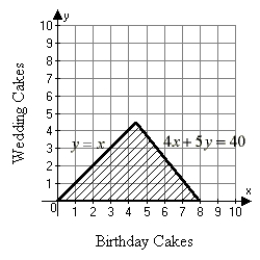
B)
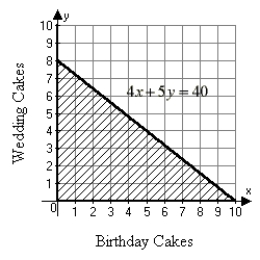
C)
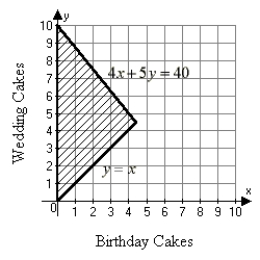
D) None of these.
A)

B)

C)

D) None of these.

Unlock Deck
Unlock for access to all 50 flashcards in this deck.
Unlock Deck
k this deck
5
Raphael can load a large shipping truck in 12 hours. Working together, Raphael and Jana can load the same truck in 3 hours. How long would it take Jana to load the truck by herself?
A) 3 hours
B) 5 hours
C) 6 hours
D) 4 hours
A) 3 hours
B) 5 hours
C) 6 hours
D) 4 hours

Unlock Deck
Unlock for access to all 50 flashcards in this deck.
Unlock Deck
k this deck
6
Write the expression without negative exponents. 
A)
B)
C)
D)

A)

B)

C)

D)


Unlock Deck
Unlock for access to all 50 flashcards in this deck.
Unlock Deck
k this deck
7
Conrad builds picnic tables and porch swings which he sells at flea markets. A picnic table requires six 24's and nine 16's. A swing uses three 24's and six 16's. Conrad currently has 108 24's and 180 16's in his inventory. If tables sell for $50 and swings sell for $30, how many of each item should Conrad make in order to maximize his revenue?
A) 15 picnic tables and 10 porch swings
B) 0 picnic tables and 30 porch swings
C) 18 picnic tables and 0 porch swings
D) 12 picnic tables and 12 porch swings
A) 15 picnic tables and 10 porch swings
B) 0 picnic tables and 30 porch swings
C) 18 picnic tables and 0 porch swings
D) 12 picnic tables and 12 porch swings

Unlock Deck
Unlock for access to all 50 flashcards in this deck.
Unlock Deck
k this deck
8
Factor. 64y3 - 125z3
A) (4y + 5z)(16y2 - 20yz + 25z2)
B) (4y - 5z)(16y2 + 20yz + 25z2)
C) (4y - 5z)(4y2 + 20yz + 5z2)
D) (4y - 5z)(16y2 - 20yz + 25z2)
A) (4y + 5z)(16y2 - 20yz + 25z2)
B) (4y - 5z)(16y2 + 20yz + 25z2)
C) (4y - 5z)(4y2 + 20yz + 5z2)
D) (4y - 5z)(16y2 - 20yz + 25z2)

Unlock Deck
Unlock for access to all 50 flashcards in this deck.
Unlock Deck
k this deck
9
Find four consecutive integers whose sum is 226.
A) 55, 57, 59, 61
B) 56, 57, 58, 59
C) 55, 56, 57, 58
D) 54, 55, 56, 57
A) 55, 57, 59, 61
B) 56, 57, 58, 59
C) 55, 56, 57, 58
D) 54, 55, 56, 57

Unlock Deck
Unlock for access to all 50 flashcards in this deck.
Unlock Deck
k this deck
10
If a golf ball is dropped from a tall building, the distance it has fallen in feet is given by 16t2, where t is the time in seconds since the ball was dropped. How far has the ball fallen after 12 seconds?
A) 240 ft
B) 192 ft
C) 1936 ft
D) 2304 ft
A) 240 ft
B) 192 ft
C) 1936 ft
D) 2304 ft

Unlock Deck
Unlock for access to all 50 flashcards in this deck.
Unlock Deck
k this deck
11
Solve the given equation. 18c2 + 3c - 10 = 0
A)
B)
C)
D) -2, 3
A)

B)

C)

D) -2, 3

Unlock Deck
Unlock for access to all 50 flashcards in this deck.
Unlock Deck
k this deck
12
Simplify. 
A)
B)
C)
D)

A)

B)

C)

D)


Unlock Deck
Unlock for access to all 50 flashcards in this deck.
Unlock Deck
k this deck
13
Together, Paul and Quincy weigh 357 pounds, Quincy and Ramon weigh 348 pounds, and Paul and Ramon weigh 337 pounds. How much does each weigh individually?
A) Paul = 175 lb., Quincy = 180 lb. , Ramon = 166 lb.
B) Paul = 163 lb., Quincy = 184 lb. , Ramon = 174 lb.
C) Paul = 173 lb., Quincy = 184 lb. , Ramon = 164 lb.
D) Paul = 181 lb., Quincy = 180 lb. , Ramon = 160 lb.
A) Paul = 175 lb., Quincy = 180 lb. , Ramon = 166 lb.
B) Paul = 163 lb., Quincy = 184 lb. , Ramon = 174 lb.
C) Paul = 173 lb., Quincy = 184 lb. , Ramon = 164 lb.
D) Paul = 181 lb., Quincy = 180 lb. , Ramon = 160 lb.

Unlock Deck
Unlock for access to all 50 flashcards in this deck.
Unlock Deck
k this deck
14
Write an equation that represents a line l that goes through (12, 5) and has a slope of  .
.
A)
B)
C)
D)
 .
.A)

B)

C)

D)


Unlock Deck
Unlock for access to all 50 flashcards in this deck.
Unlock Deck
k this deck
15
Simplify. 
A)
B)
C)
D)

A)

B)

C)

D)


Unlock Deck
Unlock for access to all 50 flashcards in this deck.
Unlock Deck
k this deck
16
Justin is shopping for new tires for his 4-wheel-drive truck. In addition to the price of the tires, there is a 7% sales tax plus a state-mandated $40 fee for disposing of his old tires. If Justin has determined that he will spend less than $301.08 total, then what is the price range he can spend on the tire set?
A) $244 or more
B) Less than $244
C) Less than $248
D) At least $247
A) $244 or more
B) Less than $244
C) Less than $248
D) At least $247

Unlock Deck
Unlock for access to all 50 flashcards in this deck.
Unlock Deck
k this deck
17
Solve the equation. Watch for extraneous solutions. 
A) -5, 5
B) No solution
C) 7, -4
D) 5

A) -5, 5
B) No solution
C) 7, -4
D) 5

Unlock Deck
Unlock for access to all 50 flashcards in this deck.
Unlock Deck
k this deck
18
The solution set is not the empty set for which one of the following inequalities?
A)

B)

C)

D)

A)

B)

C)

D)


Unlock Deck
Unlock for access to all 50 flashcards in this deck.
Unlock Deck
k this deck
19
Find the x- and y-intercepts of 7x - 2y = -5 and use these intercepts to graph the equation.
A)
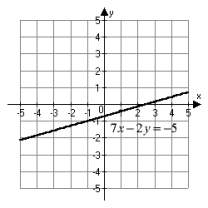
B)
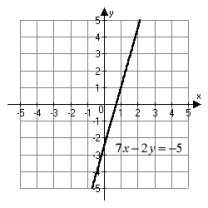
C)
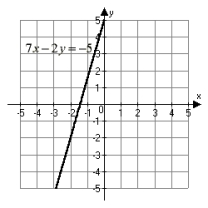
D)
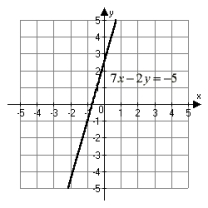
A)

B)

C)

D)


Unlock Deck
Unlock for access to all 50 flashcards in this deck.
Unlock Deck
k this deck
20
Solve the absolute value inequality and graph the solution. |x - 1| 2
A)
B)
C)
D)
A)

B)

C)

D)


Unlock Deck
Unlock for access to all 50 flashcards in this deck.
Unlock Deck
k this deck
21
Find the complex solutions. 
A)
B)
C)
D)

A)

B)

C)

D)


Unlock Deck
Unlock for access to all 50 flashcards in this deck.
Unlock Deck
k this deck
22
Find the inverse of the given function and include any domain restrictions. f(x) = (x - 6)2
A)
 + 6 for
+ 6 for

B)
 + 6 for
+ 6 for
 -6
-6
C)
 - 6 for any real number x
- 6 for any real number x
D)
 + 6 for any real number x
+ 6 for any real number x
A)
 + 6 for
+ 6 for
B)
 + 6 for
+ 6 for -6
-6C)
 - 6 for any real number x
- 6 for any real number xD)
 + 6 for any real number x
+ 6 for any real number x
Unlock Deck
Unlock for access to all 50 flashcards in this deck.
Unlock Deck
k this deck
23
Find the midpoint and length of the line segment with the endpoints (3,2) and (13,26).
A) (9, 15), 13
B) (8, 14), 13
C) (-2, -10), 26
D) (8, 14), 26
A) (9, 15), 13
B) (8, 14), 13
C) (-2, -10), 26
D) (8, 14), 26

Unlock Deck
Unlock for access to all 50 flashcards in this deck.
Unlock Deck
k this deck
24
The owner of a hobby store bought a case of 9-volt batteries for $24.00. He marked the price up such that his profit was $1.76 per battery. After selling 12 batteries, the store owner had recovered his cost. How many 9-volt batteries are in a case?
A) 100 batteries
B) 110 batteries
C) 105 batteries
D) 95 batteries
A) 100 batteries
B) 110 batteries
C) 105 batteries
D) 95 batteries

Unlock Deck
Unlock for access to all 50 flashcards in this deck.
Unlock Deck
k this deck
25
Find all real solutions of the given equation. (x2 - x)2 - 39(x2 - x) - 126 = 0
A) {-7, 6}
B) {-7, 3, 6}
C) {-6, -3, 7}
D) {-6, 7}
A) {-7, 6}
B) {-7, 3, 6}
C) {-6, -3, 7}
D) {-6, 7}

Unlock Deck
Unlock for access to all 50 flashcards in this deck.
Unlock Deck
k this deck
26
Solve. (z + 4)1/3 = -4
A) {-68, 68}
B) {-60}
C) {-68}
D) {-68, -60}
A) {-68, 68}
B) {-60}
C) {-68}
D) {-68, -60}

Unlock Deck
Unlock for access to all 50 flashcards in this deck.
Unlock Deck
k this deck
27
For the given polynomial, find the x-intercepts and determine the behavior of the graph of the polynomial at each x-intercept. f(x) = x3 - 10x2
A) Crosses at (10, 0) and at (-10, 0) but does not cross at (0, 0)
B) Crosses at (10, 0) but does not cross at (0, 0)
C) Crosses at (10, 0)
D) Crosses at (10, 0) and at (0, 0)
A) Crosses at (10, 0) and at (-10, 0) but does not cross at (0, 0)
B) Crosses at (10, 0) but does not cross at (0, 0)
C) Crosses at (10, 0)
D) Crosses at (10, 0) and at (0, 0)

Unlock Deck
Unlock for access to all 50 flashcards in this deck.
Unlock Deck
k this deck
28
If $700 is deposited in an account paying 9% compounded continuously, then what amount will be in the account after 5 years?
A) $1,097.82
B) $960.06
C) $2,157.15
D) $1,262.74
A) $1,097.82
B) $960.06
C) $2,157.15
D) $1,262.74

Unlock Deck
Unlock for access to all 50 flashcards in this deck.
Unlock Deck
k this deck
29
Write ln(x10) - ln(x6) as a single logarithm.
A) ln(x4)
B) The logarithms cannot be combined.
C) ln(x60)
D) ln(x16)
A) ln(x4)
B) The logarithms cannot be combined.
C) ln(x60)
D) ln(x16)

Unlock Deck
Unlock for access to all 50 flashcards in this deck.
Unlock Deck
k this deck
30
If a rancher has one sheep with hoof and mouth disease in a flock of 1600, then the time in days t for n sheep to become infected is modeled by  . To the nearest tenth, find the number of days it takes for one-half of the flock to contract the disease.
. To the nearest tenth, find the number of days it takes for one-half of the flock to contract the disease.
A) 14.8 days
B) 22.1 days
C) 15.6 days
D) 36.8 days
 . To the nearest tenth, find the number of days it takes for one-half of the flock to contract the disease.
. To the nearest tenth, find the number of days it takes for one-half of the flock to contract the disease.A) 14.8 days
B) 22.1 days
C) 15.6 days
D) 36.8 days

Unlock Deck
Unlock for access to all 50 flashcards in this deck.
Unlock Deck
k this deck
31
Solve the inequality. Graph the solution set. x2 + 10x + 21 ≥ 0
A)
B)
C)
D)
A)

B)

C)

D)


Unlock Deck
Unlock for access to all 50 flashcards in this deck.
Unlock Deck
k this deck
32
Which choice below is the correct graph of  ?
?
A)
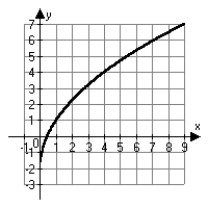
B)
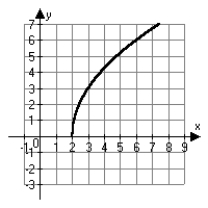
C)
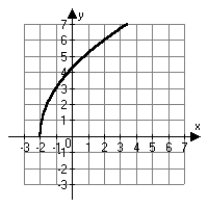
D)
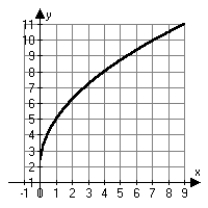
 ?
?A)

B)

C)

D)


Unlock Deck
Unlock for access to all 50 flashcards in this deck.
Unlock Deck
k this deck
33
Which of the following is the correct graph of y = x2 + 1?
A)
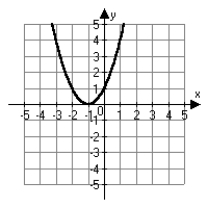
B)
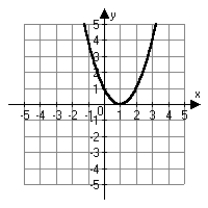
C)
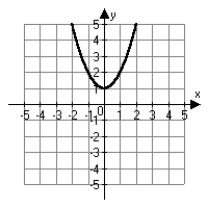
D)
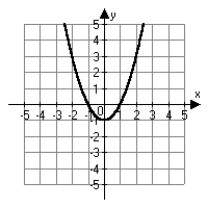
A)

B)

C)

D)


Unlock Deck
Unlock for access to all 50 flashcards in this deck.
Unlock Deck
k this deck
34
In a certain country there are currently 125 million workers and 50 million retired people. The population of workers is decreasing according to the formula  , where t is in years and W is in millions. The population of retired people is increasing according to the formula
, where t is in years and W is in millions. The population of retired people is increasing according to the formula  , where t is in years and R is in millions. In how many years will the number of workers equal the number of retired people?
, where t is in years and R is in millions. In how many years will the number of workers equal the number of retired people?
A) 13.1 years
B) 14.1 years
C) 5.3 years
D) 10.8 years
 , where t is in years and W is in millions. The population of retired people is increasing according to the formula
, where t is in years and W is in millions. The population of retired people is increasing according to the formula  , where t is in years and R is in millions. In how many years will the number of workers equal the number of retired people?
, where t is in years and R is in millions. In how many years will the number of workers equal the number of retired people?A) 13.1 years
B) 14.1 years
C) 5.3 years
D) 10.8 years

Unlock Deck
Unlock for access to all 50 flashcards in this deck.
Unlock Deck
k this deck
35
How are the graphs of  and
and  related?
related?
A) The graph of g(x) is the same as that of f(x), but translated upward by 4 units.
B) The graph of g(x) is the same as that of f(x), but translated downward by 4 units.
C) The graph of g(x) is the same as that of f(x), but translated 4 units to the right.
D) The graph of g(x) is the same as that of f(x), but translated 4 units to the left.
 and
and  related?
related?A) The graph of g(x) is the same as that of f(x), but translated upward by 4 units.
B) The graph of g(x) is the same as that of f(x), but translated downward by 4 units.
C) The graph of g(x) is the same as that of f(x), but translated 4 units to the right.
D) The graph of g(x) is the same as that of f(x), but translated 4 units to the left.

Unlock Deck
Unlock for access to all 50 flashcards in this deck.
Unlock Deck
k this deck
36
Determine all asymptotes for the graph of the given function. 
A) Vertical : x = -2; Oblique:

B) Vertical : x = 2; Horizontal: x-axis.
C) Vertical : x = -2; Horizontal: x-axis.
D) Vertical : x = 2; Oblique:


A) Vertical : x = -2; Oblique:

B) Vertical : x = 2; Horizontal: x-axis.
C) Vertical : x = -2; Horizontal: x-axis.
D) Vertical : x = 2; Oblique:


Unlock Deck
Unlock for access to all 50 flashcards in this deck.
Unlock Deck
k this deck
37
Solve 4-6x - 10 = 16-4x - 1.
A) {5}
B) {-4}
C) {6}
D) {4}
A) {5}
B) {-4}
C) {6}
D) {4}

Unlock Deck
Unlock for access to all 50 flashcards in this deck.
Unlock Deck
k this deck
38
Find the imaginary solutions: 100x2 + 160x + 100 = 0
A)

B)

C)

D)

A)

B)

C)

D)


Unlock Deck
Unlock for access to all 50 flashcards in this deck.
Unlock Deck
k this deck
39
Find the complex solutions. 
A)
B) {9i}
C) {-9i, 9i}
D) {-81i, 81i}

A)

B) {9i}
C) {-9i, 9i}
D) {-81i, 81i}

Unlock Deck
Unlock for access to all 50 flashcards in this deck.
Unlock Deck
k this deck
40
Solve the given system of equations. y = x2
Y = 6
A) Ø
B) {(-6, 36), (6, 36)}
C)
D)
Y = 6
A) Ø
B) {(-6, 36), (6, 36)}
C)

D)


Unlock Deck
Unlock for access to all 50 flashcards in this deck.
Unlock Deck
k this deck
41
Which of the following is the correct graph of  ?
?
A)
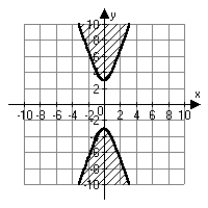
B)
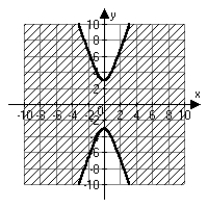
C)
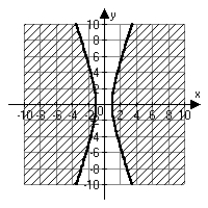
D)
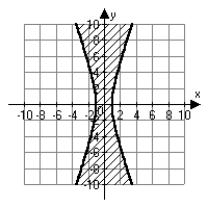
 ?
?A)

B)

C)

D)


Unlock Deck
Unlock for access to all 50 flashcards in this deck.
Unlock Deck
k this deck
42
Use the binomial theorem to expand the given binomial. (y + 1)3
A) y3 + y2 + y + 1
B) y3 + 1
C) y3 + 3y2 + 3y + 1
D) 3y3 + 3y2 + 3y + 3
A) y3 + y2 + y + 1
B) y3 + 1
C) y3 + 3y2 + 3y + 1
D) 3y3 + 3y2 + 3y + 3

Unlock Deck
Unlock for access to all 50 flashcards in this deck.
Unlock Deck
k this deck
43
Write a formula for the nth term of the given arithmetic sequence. 9, 14, 19, 24, 29, . . .
A) an = 5n + 4
B) an = 4n - 5
C) an = 5n - 4
D) an = 6n - 5
A) an = 5n + 4
B) an = 4n - 5
C) an = 5n - 4
D) an = 6n - 5

Unlock Deck
Unlock for access to all 50 flashcards in this deck.
Unlock Deck
k this deck
44
List all terms of the finite sequence an = n + 4 for 1 ≤ n ≤ 5.
A) 5, 9, 13, 17, 21
B) 4, 5, 6, 7, 8
C) 5, 6, 7, 8, 9
D) 4, 8, 12, 16, 20
A) 5, 9, 13, 17, 21
B) 4, 5, 6, 7, 8
C) 5, 6, 7, 8, 9
D) 4, 8, 12, 16, 20

Unlock Deck
Unlock for access to all 50 flashcards in this deck.
Unlock Deck
k this deck
45
Graph both equations of the system on the same coordinate axes. Use elimination to find all points of intersection. y = 1 - x2
X2 + 4y2 = 4
A) (-2, 0), (2, 0)
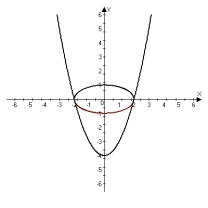
B) (0, -1),
 ,
,

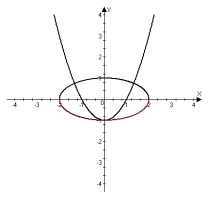
C) (-2, 0), (2, 0)
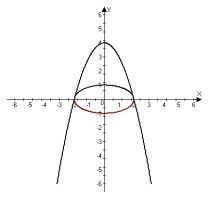
D) (0, 1),
 ,
,

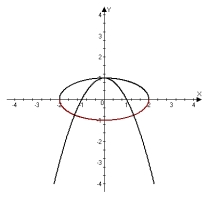
X2 + 4y2 = 4
A) (-2, 0), (2, 0)

B) (0, -1),
 ,
,

C) (-2, 0), (2, 0)

D) (0, 1),
 ,
,


Unlock Deck
Unlock for access to all 50 flashcards in this deck.
Unlock Deck
k this deck
46
Find the sum of the given infinite geometric series. 16 + 12 + 9 + ...
A) "64"
B) ""
C) "68"
D) "60"
A) "64"
B) ""
C) "68"
D) "60"

Unlock Deck
Unlock for access to all 50 flashcards in this deck.
Unlock Deck
k this deck
47
Write the standard equation for the circle with the given radius and center. Center (9, 5), radius 
A) (x + 9)2 + (y + 5)2 = 196
B) (x - 9)2 + (y - 5)2 = 196
C) (x - 9)2 + (y - 5)2 = 14
D) (x + 9)2 + (y + 5)2 = 14

A) (x + 9)2 + (y + 5)2 = 196
B) (x - 9)2 + (y - 5)2 = 196
C) (x - 9)2 + (y - 5)2 = 14
D) (x + 9)2 + (y + 5)2 = 14

Unlock Deck
Unlock for access to all 50 flashcards in this deck.
Unlock Deck
k this deck
48
Complete the rewriting of the given series using the new index as indicated.  (2i + 1) =
(2i + 1) = 
A)
 (2i + 1) =
(2i + 1) =
 (2j + 2)
(2j + 2)
B)
 (2i + 1) =
(2i + 1) =
 (2j + 3)
(2j + 3)
C)
 (2i + 1) =
(2i + 1) =
 (2j + 4)
(2j + 4)
D)
 (2i + 1) =
(2i + 1) =
 (2j + 3)
(2j + 3)
 (2i + 1) =
(2i + 1) = 
A)
 (2i + 1) =
(2i + 1) = (2j + 2)
(2j + 2)B)
 (2i + 1) =
(2i + 1) = (2j + 3)
(2j + 3)C)
 (2i + 1) =
(2i + 1) = (2j + 4)
(2j + 4)D)
 (2i + 1) =
(2i + 1) = (2j + 3)
(2j + 3)
Unlock Deck
Unlock for access to all 50 flashcards in this deck.
Unlock Deck
k this deck
49
Find the sum of the given series. 
A) -108
B) 99
C) -99
D) 108

A) -108
B) 99
C) -99
D) 108

Unlock Deck
Unlock for access to all 50 flashcards in this deck.
Unlock Deck
k this deck
50
Write the given equation in the form y = a(x - h)2 + k and identify the vertex, focus, and directrix. y = 3x2 - 8x + 5
A) Vertex:
 ; Focus:
; Focus:
 ; Directrix:
; Directrix:

B) Vertex:
 ; Focus:
; Focus:
 ; Directrix:
; Directrix:

C) Vertex:
 ; Focus:
; Focus:
 ; Directrix:
; Directrix:

D) Vertex:
 ; Focus:
; Focus:
 ; Directrix:
; Directrix:

A) Vertex:
 ; Focus:
; Focus: ; Directrix:
; Directrix:
B) Vertex:
 ; Focus:
; Focus: ; Directrix:
; Directrix:
C) Vertex:
 ; Focus:
; Focus: ; Directrix:
; Directrix:
D) Vertex:
 ; Focus:
; Focus: ; Directrix:
; Directrix:

Unlock Deck
Unlock for access to all 50 flashcards in this deck.
Unlock Deck
k this deck


